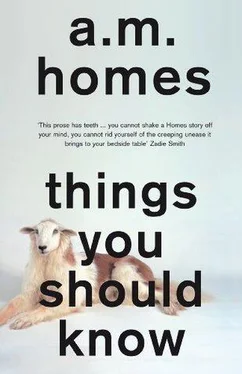She is wheeled back to her room, sad, agitated, angry.
“Why didn’t you come and see me?” she asks accusatorily.
“I was right there the whole time, on the other side of the door, waiting for word.”
She acts as though she doesn’t believe me, as though I screwed with a secretary from the patient services office while she was on the table.
“How’re you feeling?”
“Like I’ve taken a trip to another country and my suitcases are lost.”
She is writhing. I adjust her pillow, the position of the bed.
“What hurts?”
“What doesn’t hurt? Everything hurts. Breathing hurts.”
Because she is a doctor, because she did her residency at this hospital, they give me a small folding cot to set up in the corner of the room. Bending to unfold it, something happens in my back, a hot searing pain spreads across and down. I lower myself to the floor, grabbing the blanket as I go.
Luckily she is sleeping.
The nurse who comes to check her vital signs sees me. “Are you in trouble?”
“It’s happened before,” I say. “I’ll just lie here and see where it goes.”
She brings me a pillow and covers me with the blanket.
Eric and Enid arrive. My wife is asleep and I am still on the floor. Eric stands over me.
“We’re sorry,” Eric whispers. “We didn’t get your message until today. We were at Enid’s parents’—upstate.”
“It’s shocking, it’s sudden, it’s so out of the blue.” Enid moves to look at my wife. “She looks like she’s in a really bad mood, her brow is furrowed. Is she in pain?”
“I assume so.”
“If there’s anything we can do, let us know,” Eric says.
“Actually, could you walk the dog?” I pull the keys out of my pocket and hold them in the air. “He’s been home alone all day.”
“Walk the dog — I think we can do that,” Eric says, looking at Enid for confirmation.
“We’ll check on you in the morning,” Enid says.
“Before you go; there’s a bottle of Percoset in her purse — give me two.”
During the night she wakes up. “Where are you?” she asks.
“I’m right here.”
She is sufficiently drugged that she doesn’t ask for details. At around six she opens her eyes and sees me on the floor.
“Your back?”
“Yep.”
“Cancer beats back,” she says and falls back to sleep.
When the cleaning man comes with the damp mop, I pry myself off the floor. I’m fine as long as I’m standing.
“You’re walking like you have a rod up your ass,” my wife says.
“Is there anything I can do for you?” I ask, trying to be solicitous.
“Can you have cancer for me?”
The pain management team arrives to check on my wife’s level of comfort.
“On a scale of one to ten, how do you feel?” the pain fellow asks.
“Five,” my wife says.
“She lies,” I say.
“Are you lying?”
“How can you tell?”
The specialist arrives. “I know you,” he says, seeing my wife in the bed. “We went to school together.”
My wife tries to smile.
“You were the smartest one in the class and now look,” he reads my wife’s chart. “Ovarian cancer and you, that’s horrible.”
My wife is sitting up high in her hospital bed, puking her guts into a metal bucket, like a poisoned pet monkey. She is throwing up bright green like an alien. Ted, her boss, stares at her, mesmerized.
The room is filled with people — people I don’t know, medical people, people she went to school with, people she did her residency with, a man whose fingers she sewed back on, relatives I’ve not met. I don’t understand why they don’t excuse themselves, why they don’t step out of the room. I don’t understand why there is no privacy. They’re all watching her like they’ve never seen anyone throw up before — riveted.
She is not sleeping. She is not eating. She is not getting up and walking around. She is afraid to leave her bed, afraid to leave her bucket.
I make a sign for the door. I borrow a black Magic Marker from the charge nurse and print in large black letters, DO NOT DISTURB.
They push the door open. They come bearing gifts, flowers, food, books. “I saw the sign, I assumed it was for someone else.”
I am wiping green spittle from her lips.
“Do you want me to get rid of everyone?” I ask.
I want to get rid of everyone. The idea that these people have some claim to her, some right to entertain, distract, bother her more than I, drives me up the wall. “Should I tell them to go?”
She shakes her head. “Just the flowers, the flowers nauseate me.”
An hour later, I empty the bucket again. The room remains overcrowded. I am on my knees by the side of her hospital bed, whispering, “I’m leaving.”
“Are you coming back?” she whispers.
“No.”
She looks at me strangely. “Where are you going?”
“Away.”
“Bring me a Diet Coke.”
She has missed the point.
It is heartbreaking seeing her in a stained gown, in the middle of a bed, unable to tell everyone to go home, unable to turn it off. Her pager is clipped to her hospital gown, several times it goes off. She returns the calls. She always returns the calls. I imagine her saying, “What the hell are you bothering me for — I’m busy, I’m having cancer.”
Later, I am on the edge of the bed, looking at her. She is increasingly beautiful, more vulnerable, female.
“Honey?”
“What?” Her intonation is like a pissy caged bird— cawww . “What? What are you looking at? What do you want?” Cawww .
“Nothing.”
I am washing her with a cool washcloth.
“You’re tickling me,” she complains.
“Make sure you tell her you still find her attractive,” a man in the hall tells me. “Husbands of women who have mastectomies need to keep reminding their wives that they are beautiful.”
“She had a hysterectomy,” I say.
“Same thing.”
Two days later, they remove the packing. I am in the room when the resident comes with a long tweezers like tongs and pulls yards of material from her vagina, wads of cotton, and gauze, stained battlefield red. It’s like a magic trick gone awry, one of those jokes about how many people you can fit in a telephone booth, more and more keeps coming out.
“Is there anything left in there?” she asks.
The resident shakes his head. “Your vagina now just comes to a stop, it’s a stump, an unconnected sleeve. Don’t be surprised if you bleed, if you pop a stitch or two.” He checks her chart and signs her out. “Kibbowitz has you on pelvic rest for six weeks.”
“Pelvic rest?” I ask.
“No fucking,” she says.
Not a problem.
Home. She watches forty-eight hours of Holocaust films on cable TV. Although she claims to compartmentalize everything, suddenly she identifies with the bald, starving prisoners of war. She sees herself as a victim. She points to the naked corpse of a woman. “That’s me,” she says. “That’s exactly how I feel.”
“She’s dead,” I say.
“Exactly.”
Her notorious vigilance is gone. As I’m fluffing her pillows, her billy club rolls out from under the bed. “Put it in the closet,” she says.
“Why?” I ask, rolling it back under the bed.
“Why sleep with a billy club under the bed? Why do anything when you have cancer?”
During a break between Shoah and The Sorrow and the Pity , she taps me. “I’m missing my parts,” she says. “Maybe one of those lost eggs was someone special, someone who would have cured something, someone who would have invented something wonderful. You never know who was in there. They are my lost children.”
Читать дальше












